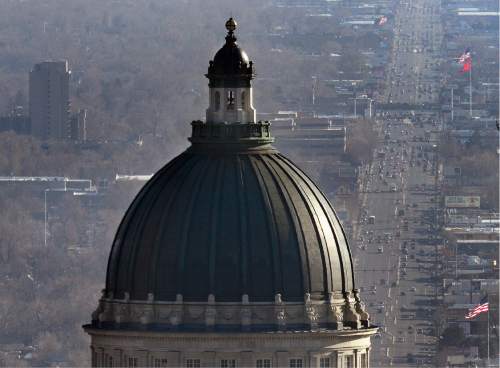This is an archived article that was published on sltrib.com in 2016, and information in the article may be outdated. It is provided only for personal research purposes and may not be reprinted.
Environmental advocates awarded Utah lawmakers more "A" grades on their report cards for the 2016 legislative session, but overall, they said, Utah's leaders still aren't keen on green legislation.
The Sierra Club and HEAL Utah both produced scorecards "grading" lawmakers according to whether they voted for bills the advocacy groups believed would improve the environment, and against those that would harm it. The Sierra Club failed both the House and Senate, with average scores of 44 and 54 percent, respectively. HEAL Utah was a little more generous, giving the House an average score of 69 percent and the Senate a 73.
HEAL Utah executive director Matt Pacenza said the disparity was probably related to the different bills the organizations chose to include in the analyses. HEAL Utah's scores took votes on 12 bills into account, and the Sierra Club considered about half that.
"We did look at a somewhat broader range," Pacenza said. "We wanted to look at all the clean air bills, and there were quite a few, as well as the big bills we both looked at."
It took some extra time to tabulate votes on the large number of air quality bills that were considered in this year's session, Pacenza said, which delayed the release of HEAL's scorecard.
The group focused on bills related to clean air and energy — including Rocky Mountain Power's Sustainable Transportation and Energy Plan, which the Sierra Club did not include in its report.
The Sierra Club did not consider numerous smaller air and energy bills, but did look at major public lands initiatives that fall outside HEAL's purview.
Both groups considered controversial water bill SB80, which would divert funds to large-scale water projects such as the Lake Powell Pipeline and the Bear River Project; HB250, the bill that aimed to reinstate the Air Quality Board's rule banning the sale of high-emission water heaters; and SB246, which dedicates $53 million to the construction of a coal export terminal in California.
The Sierra Club's resulting report also was less favorable to Republicans than HEAL's. Republicans averaged a 66 percent from HEAL Utah, and Democrats averaged 96. In the Sierra Club's analysis, Republicans averaged 40 percent while Democrats averaged 96.
HEAL Utah awarded "A" grades to 27 lawmakers. The Sierra Club gave 13 lawmakers the same honor.
That's more than it has awarded in the past, but Utah chapter director Mark Clemens said the advocacy group still felt the recent session was a disappointment.
"Overall when you look at the work product of the 2016 legislature," he said, "I think you have to conclude that they really did fail Utah's environment."
While Pacenza agreed that the overall attitude among Utah lawmakers has not changed, he said he does see signs that the Legislature is willing to take "certain steps to improve air quality."
"I think it's possible to look at this year and say hey, we've got some decent measures," he said. "But overall we still see some pretty significant steps taken in the wrong directions."
Twitter: @emapen



